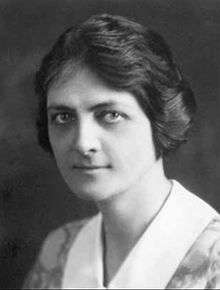Charlotte Elliott (botanist)
Charlotte Elliott (1883-1974) was a pioneering American plant physiologist specializing in bacterial organisms that cause disease in crops who was the author of a much-used reference work, the Manual of Bacterial Plant Pathogens.[1][2] She was the first woman to receive a Ph.D. in botany from the University of Wisconsin, Madison.[1][2]
Charlotte Elliott | |
|---|---|
 | |
| Born | 1883 |
| Died | 1974 |
| Nationality | American |
| Alma mater | Stanford University; University of Wisconsin, Madison |
| Known for | research on plant disease vectors |
| Scientific career | |
| Fields | botany, plant physiology |
| Institutions | USDA |
| Patrons | Erwin Frink Smith |
| Author abbrev. (botany) | C.Elliott |
Education
Elliott was born in Berlin, Wisconsin. She got her undergraduate degree in zoology at Stanford University in 1907. For a few years afterwards she taught biology at the state normal school in Spearfish and took summer courses at the University of Chicago.[3][4] She returned to Stanford for master's work in plant physiology, receiving her A.M. in 1913.[1] She was offered an appointment as assistant in the botany department but refused for reasons having to do with her family and instead returned to Wisconsin.[3]
In Wisconsin, she worked for two years (1914–16) as an instructor at South Dakota State College of Agriculture and Mechanic Arts.[3][4] She left to pursue graduate work in plant pathology, first as a research assistant at the Brooklyn Botanic Garden and then as a Ph.D. student at the University of Wisconsin, Madison, where she was supported by a Boston Alumne Fellowship.[3][4] In 1918, she became the first woman to complete the doctoral program in botany at the University of Wisconsin, Madison.[1] Her thesis work focused on halo blight, a disease affecting oats.[1]
Career
Elliott was recruited by the bacteriologist Erwin Frink Smith to work in the Bureau of Plant Industry at the United States Department of Agriculture (USDA).[1] There she continued her research as a phytobacteriologist or specialist in the organisms harmful to plants, publishing numerous papers in her field.[1][2] Among her scientifically notable papers is one establishing the role of the flea beetle as a vector in the development of the disease known as Stewart's Wilt in corn (maize).[1] This research led to a method for forecasting how bad the disease would be in any given year based on temperature indexes that reflected how successfully the beetles had survived the preceding winter.[1] Her work also led to the description of several new species.[2]
Elliott wrote a widely used book, Manual of Bacterial Plant Pathogens, first published in 1930, reissued with revisions in 1951, and still being drawn on by researchers today.[1][2][5]
In 1942, she served as the president of the Botanical Society of Washington.[6]
Elliott died in 1974.
Selected publications
Books
- Manual of Bacterial Plant Pathogens (1930)
- Halo-Blight of Oats (1920)
Articles
- "Helminthosporium-Turcicum Leaf Blight of Corn". Phytopathology 36.8 (1946): 660-666. With Merle T. Jenkins.
- "Seasonal Development, Insect Vectors, and Host Range of Bacterial Wilt of Sweet Corn." Journal of Agricultural Research 60.10 (1940): 645-686. With F.W. Poos.
- "Dissemination of Bacterial Wilt of Corn." Iowa State College Journal of Science 9 (1935): 461-480.
- "Overwintering of Aplanobacter stewarti." Science 80.2074 (1934): 289-290. With F.W. Poos.
References
- Andrews, John H., ed. "Charlotte Elliott: Accomplished Phytobacteriologist and First Female PhD". In And One Hand on the Bench: The First Century of the Department of Plant Pathology at the University of Wisconsin-Madison. University of Wisconsin, 2010. Accessed Nov. 11, 2015.
- "Pioneering Plant Pathologists". American Phytopathological Society website. Accessed Nov. 11, 2015.
- Association of Collegiate Alumnae. The Journal of the Association of Collegiate Alumnae, vol 10 (September 1916–June 1917), p. 678. Ithaca, NY: Association of Collegiate Alumnae.
- Gager, C. Stuart, ed.. Brooklyn Botanic Garden Record, vol. 5, no. 4 (October 1916), pp. 151–152.
- Horst, R. Kenneth, ed. Westcott's Plant Disease Handbook. Springer Science + Business Media, 2001.
- "Presidents of the Botanical Society of Washington", The Botanical Society of Washington website. Accessed Nov. 11, 2015.
- IPNI. C.Elliott.
Further reading
- Matta, C.. "Charlotte Elliott (1883–1974): Great Interest and Unusual Natural Ability". In Pioneering Women in Plant Pathology, J. B. Ristaino, ed. St Paul, MN: American Phytopathological Society Press, 2008, pp. 47–56.
- Robert, A. L., and J. G. Moseman. "Charlotte Elliott, 1883–1974". Phytopathology 66, 1976, p. 237.